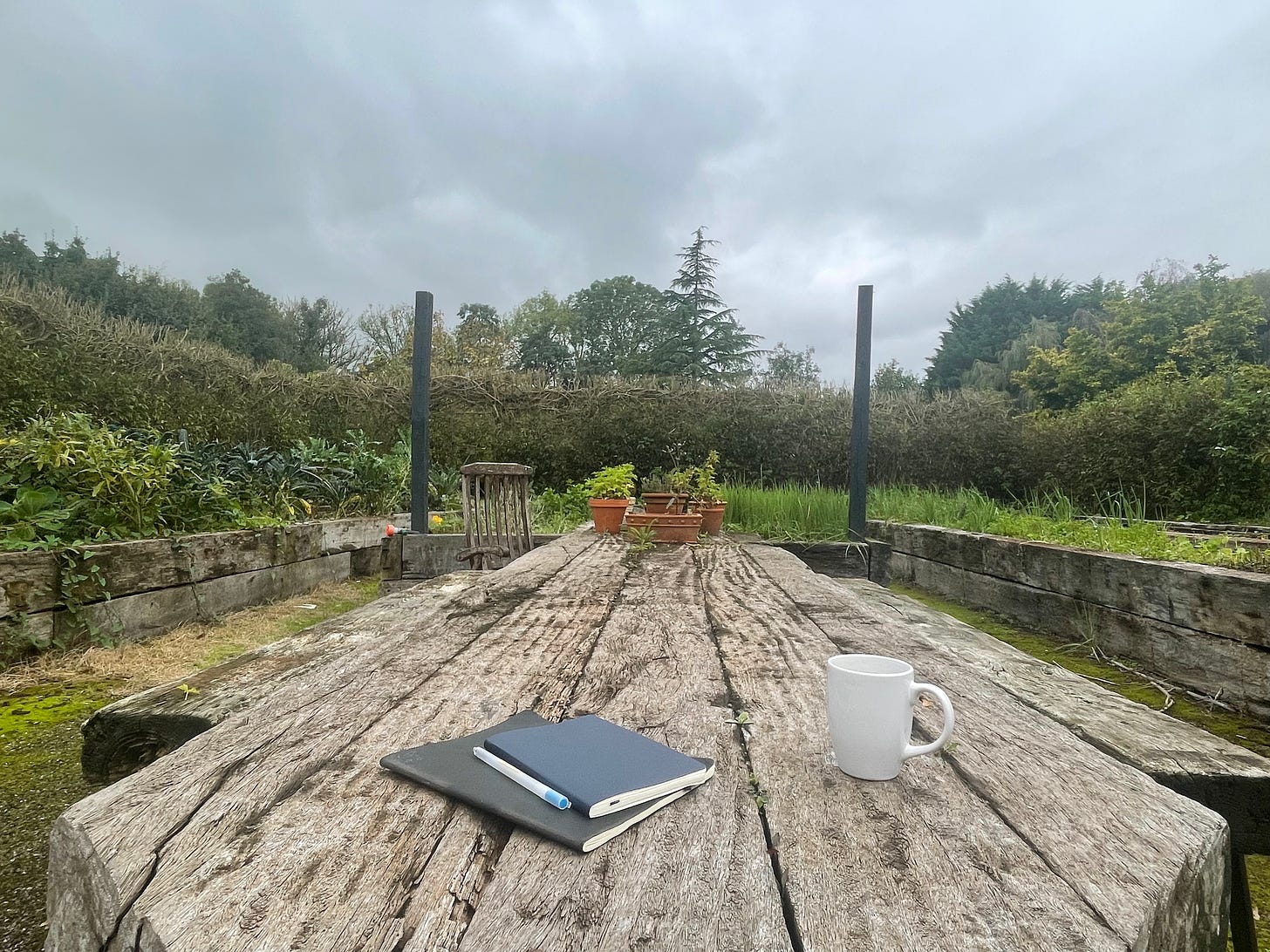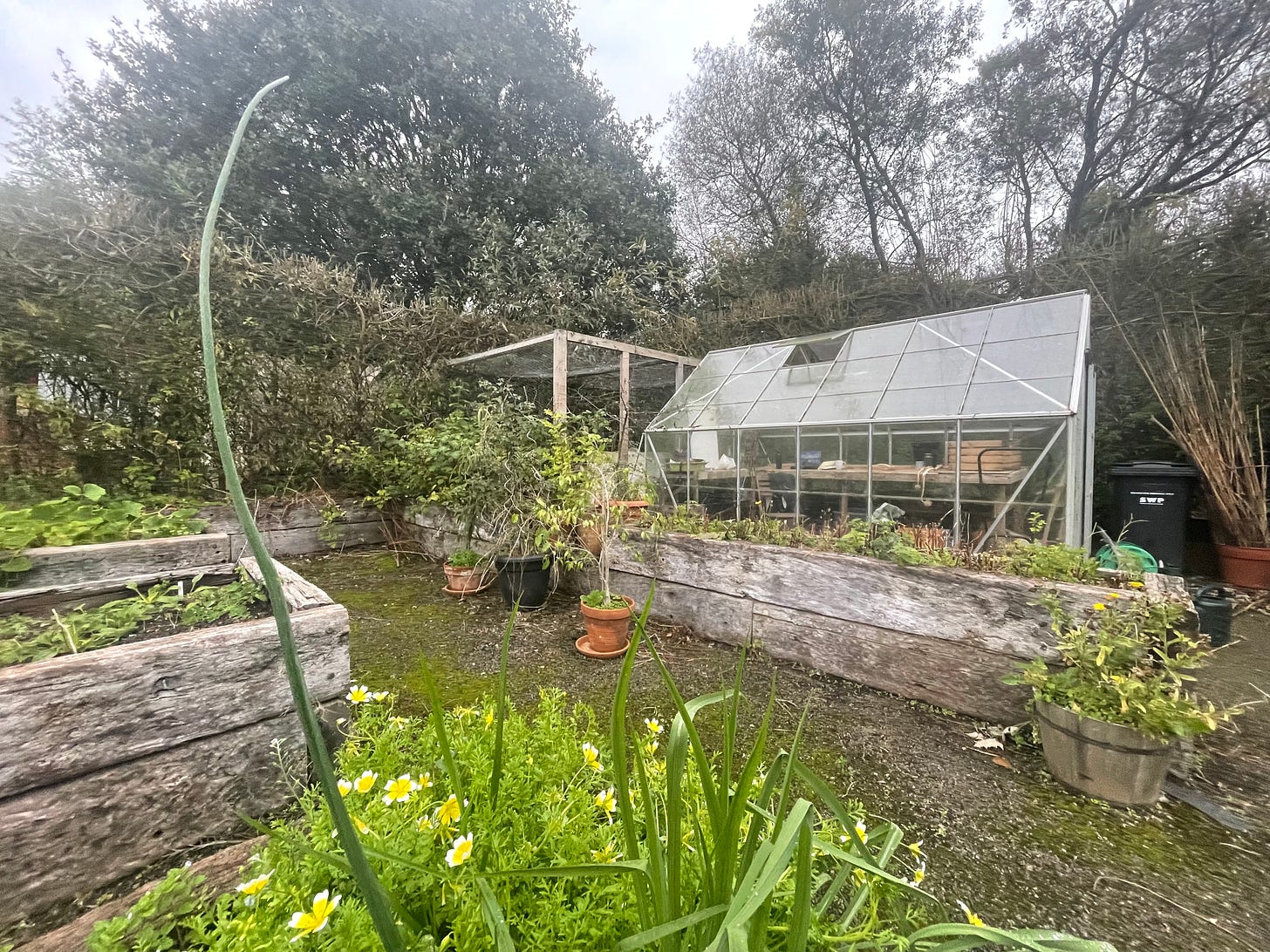I have moved a lot this month. Many miles covered overground, revisiting places dear and familiar, finding others that newly settle into soul. Making sense of it through writing. Landing on the page when not at home.
Last week I was in Devon, on a writing retreat at the beautiful Selgars Mill. The old mill and the river held us; spaces seemed as liminal as the autumn leaves. There was a general air of desk hopping – people responded to place and moved as they must. I spent most of my time working outside, choosing sun on my face and views of the veg patch. When the weather turned, I retreated to the greenhouse and the simplicity of rain-pattered glass, familiar smells, and the odd forgotten seedhead.
For a writer and a gardener there are parallels between desk and potting bench. Sowing the seeds, seeing what takes, weeding and editing, hoping for flower or fruit. These processes are satisfyingly gentle when not in the relentless production of spring or deadlines. As stacks of empty seed trays await warmer months; there is a joyful ease to sitting down with nothing but a notebook and a pen.
The retreat was for changemakers, led gracefully by Anna Birney and Louise Armstrong of the School of System Change. There was an impressive diversity of thought and action in my companions, united by a common goal to make the world a better place. And write. I spent the first day or two battling with my own identity as a changemaker. I didn’t think I was one. I’m not even sure I really knew what a changemaker was.
Friends of mine who are informed, well read, who are my go-to for relevant and of-the-moment thought, look perplexed at the term. They can work it out, sort of, but they leap to governance, policy and rebellion. It can include these things, but that doesn’t cover the heart and nuts and bolts of how things are and could be better. Ashoka, the social entrepreneurship organisation, defines a changemaker as “one who desires change in the world and, by gathering knowledge and resources, makes that change happen”. It’s a pretty simple concept really, and yet somehow language doesn’t do it justice.
Such linguistic frustration runs across most subcultures and areas of expertise, from academic treatises to business speak. The in-house lingo of silos and echo chambers can alienate as much as it illuminates. It can stop making sense, even to those it is written for. When we can’t comprehend the language of our tribe, we feel excluded; it tests our evolutionary sense of belonging and safety. The only solution is to simplify. We must examine our habitual, default phrases and strip them back to their essential meaning.
This isn’t a piece about the failings of language, however. (There will no doubt be more from me on this, anon.) Instead, it is about the power and privilege of dedicating time and space away from normal life in which to write. That feels strange to say, when writing is my job and weaves throughout said normal life. And yet there is something precious and extraordinary about convening with unknown, like-minded folk who have committed to their writing with such bold intention.
Themes of identity recurred throughout the group as we explored who we are as writers among our many other parts. Each came to it with a bravery, an openness and, at times, a vulnerability that were inspiring. Facilitation appeared effortless: any events or sessions were fluid, gentle, never prescribed; responding to the needs, skills and offerings of the group. We played with process, tested out ideas, shared inspiration, tips and tricks. I think most of us left with a different, and perhaps greater, sense of what it is to write.
Conversations roamed far and wide, thrilling in their breadth and scope. We cooked, ate and walked together. Within this there was deep respect, protecting space for ourselves, each other, and our words. The writing game can often feel a solitary one. The week proved it can be made lighter in community, united by common purpose, celebration and support.
While navigating a week of blocks and breakthroughs, I found poetry in the spaces in between. I also made some sort of peace with my changemaking self. For me, change comes from the ground up. It can be as simple as tending to the land, honouring the roots and writing the growth. By living with intentionality, we can explore a different way of being. At the heart of this is tuning in to the rhythms of nature, and honouring the essential wildness of our souls.






Beautiful and inspiring piece. Thank you!